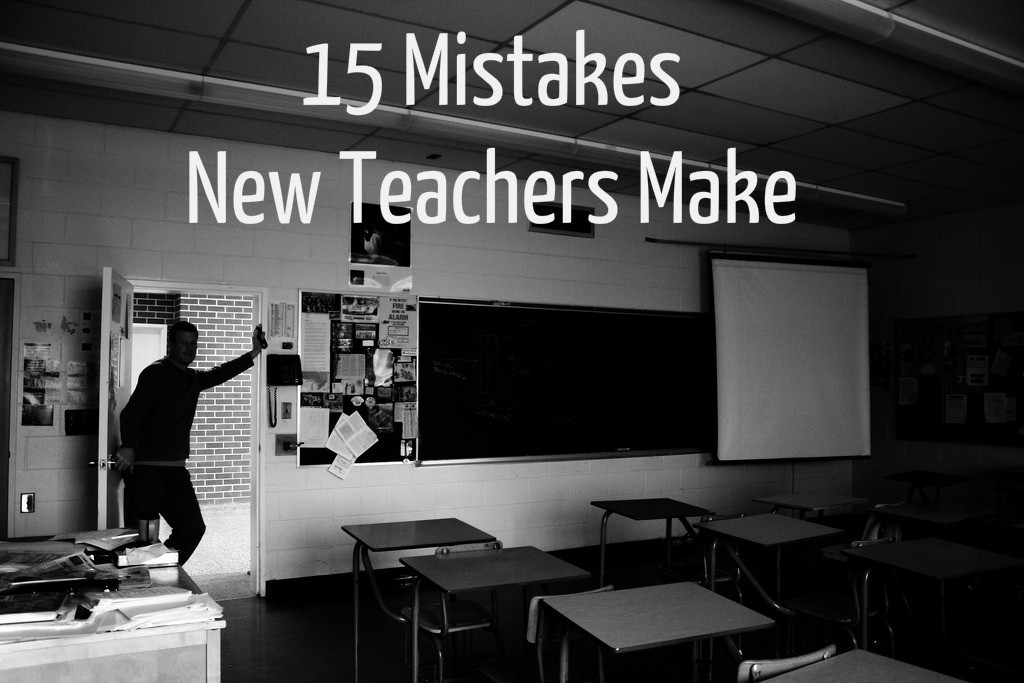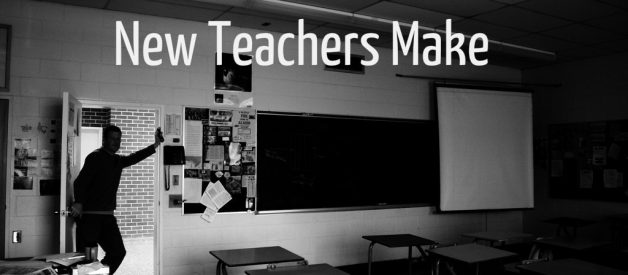I?ve had the pleasure of working with a lot of new teachers the past six years, and I?ve seen many of the same mistakes I made during my first year teaching repeated over and over. Teaching was difficult my first year, but I actually loved it and was not too overwhelmed most of the time. Needless to say, I did have my fair share of ?rookie? mistakes!
I?ve learned that the best way I can help out new teachers is by sharing my story, and what teaching was like for me that first year. The best part of making mistakes is learning from them, so even if you make some of the mistakes listed below, it?s all part of the process!

1. Never leaving school
It?s your first real job and you want to do the best possible work. But staying at school till the custodian?s lock-up is not the solution. Talk to your colleagues. Plan with a partner. You don?t need to reinvent the wheel when it comes to preparing your lessons and activities. Above all, focus on being efficient, instead of just working hard, the latter leads to teacher burnout fast.
2. Missing out on all of the extra-curricular events
I remember so many people giving me the advice to take the first year and only focus on my teaching. Awful advice. Part of teaching is being part of the community and getting involved in extra-curricular activities and events. It?s also important for your students to see you in other roles besides teacher. I took on the school newspaper and started coaching lacrosse in the spring?best two decisions I made in my first year.
3. Writing an email when a phone call would be better
This one may seem obvious to most veteran teachers, but as a new teacher, I would pour hours into crafting perfectly written emails to parents, co-workers, and administrators. In most cases, a phone call would have worked just as well, and would have saved me hours. Also, some things (especially if it involves emotion or two-sides to a situation) are better off spoken, and not written.
4. Making a phone call when a face-to-face conversation would be better
Ever heard of cabin fever? I think I had ?classroom fever? at one point in my first year. I spent WAY too much time in that classroom. When I got up, went for a walk, and talked to some people face-to-face, it would help.
5. Focusing on that ?one kid?
I don?t know many teachers that haven?t focused on that ?one kid? at some point in their careers. Hey, it happens to the best of us, and there really isn?t anything wrong with trying to help as much as possible. But, this ?savior? mentality takes an emotional toll. It also blinds us to the other 20-some kids in the classroom who need our support and encouragement. Try to find the balance even when you are pulled in one direction.
6. Trying for a ?well-managed? classroom
This is a biggie. Most of what they taught me in college made me view my job as a teacher close to one of a manager. Therefore I spent way too much time trying to make my classroom and my students ?well behaved? so I could check ?classroom management? off the list of things I had mastered. What was lost in all of this focus, was that my students needed to be engaged. And if the room looked a bit crazy, that did not matter as long as they had ?high commitment and high attention? towards the learning activity. I did not learn this lesson till the middle of the year during a crazy debate filled class that was highly engaging and just the type of learning I wanted to replicate!
7. Too many summative assessments
I was worried early on that my students would not be focused in class unless there was a summative assessment in the near future. Please do not make this mistake. Creating a forced focus because of looming assessments is one of the worst ways to instruct and engage. A better way is through formative assessments?
8. Not enough formative assessments
I missed out on this one big time. Formative assessments are the best way to see whether students understand what you are doing in class. When you check for understanding as a teacher, the results can truly inform your instruction, instead of guessing where students may be in their understanding. Check out this awesome resource from Edutopia.
9. Too much homework
Again, I thought ?rigor? was giving challenging homework. Why? Probably because when I was in high school the most challenging courses had more homework assigned. I had to shift this thinking when my grades started to reflect who did their homework instead of who demonstrated true understanding of the concepts and mastery of the skills we were covering. I?m not one to say we need to ?get rid? of all homework (sometimes this makes sense), but I did have to rethink what my purpose was for sending work home with students.
10. Contacting parents with only negative news
I saw parents at back-to-school night and then the next time I spoke to most of them was when I had to call home or email about an issue in class. I was lucky that this did not happen very often, but looking back I?m ashamed of my negative reasons for reaching out to parents/guardians. I quickly learned that sending home good news is one of the best ways to build a good relationship with parents/guardians and the community.
11. Trying to write the same lesson plans you did in college
Remember those 4?5 page lesson plans that you had to type up in college? You are going to burn yourself out real fast if you try to write that kind of lesson plan for each class every day? Also, depending on what is in the ?lesson plan? it really doesn?t connect to the learning during class, but instead ?what activities you are going to do? in class. Check out this post on learning plans and try for a shorter (but specific) approach instead.
12. Failing to think about your classroom design
Class design is more than just moving away from ?desks in rows? or seating charts. This has taken me the longest to understand, but how you set up your learning space really impact the type of collaboration and communication that goes on in the classroom.
13. Thinking about technology as something separate and special
It is important to understand technology?s role in learning. If you make technology something we are ?going to do? as a class, then it becomes a special event. The problem with this thinking (and I did this with almost every project/activity in my first year) is that technology is no longer a ?special event? in our daily lives. We use it seamlessly as an integral part of how we communicate, collaborate, create, learn, consume, and connect. So when we make technology a separate piece of learning, students get the impression that technology is only used for certain things at certain times, instead of having it available always as a resource but using it for a true learning purpose.
14. Not reaching out for enough help
If you are like me then you probably think you can do it all. I did (still do sometimes). I?d spend hours and hours working on a lesson or activity when I could have created a better lesson/activity in less time with the teacher next door. I rarely reached out to administrators for help, thinking they would see me as weak for not ?knowing? how to do everything myself. Now I ask for help all the time. And guess what, people like helping other people! It is not an inconvenience especially when you can bring a new idea or way of thinking to the discussion.
15. Thinking project-based learning is too hard
It?s hard as a new teacher to teach one lesson, at one pace, and keep all of the students engaged. But we wrestle with classroom management as if this is the only option. The issue is students are at all different levels of understanding and ability, and if you ?teach to the average? you are actually not reaching any of the students (great video here that explains the thinking.) Project-based learning, on the other hand, seems really difficult: How can I give a PBL experience that tailors my instruction and content for the wide variety of learners in my classroom?
Here?s the thing, just like anything else, it is very hard to conceptualize without a step-by-step process to getting started. It is difficult to picture until you have seen it in action.
Call to Action
This is one of the many reasons I wrote my new book, The PBL Playbook. In the book, we share countless examples of how real teachers in real classrooms (right now) are using project-based learning to reach every kid in their class. The book is being released this Memorial Day weekend. But, until then, check out the FREE Epic Guide to Student Ownership that you can sign-up for here ? and see the five PBL experiences that changed my life as a teacher.


